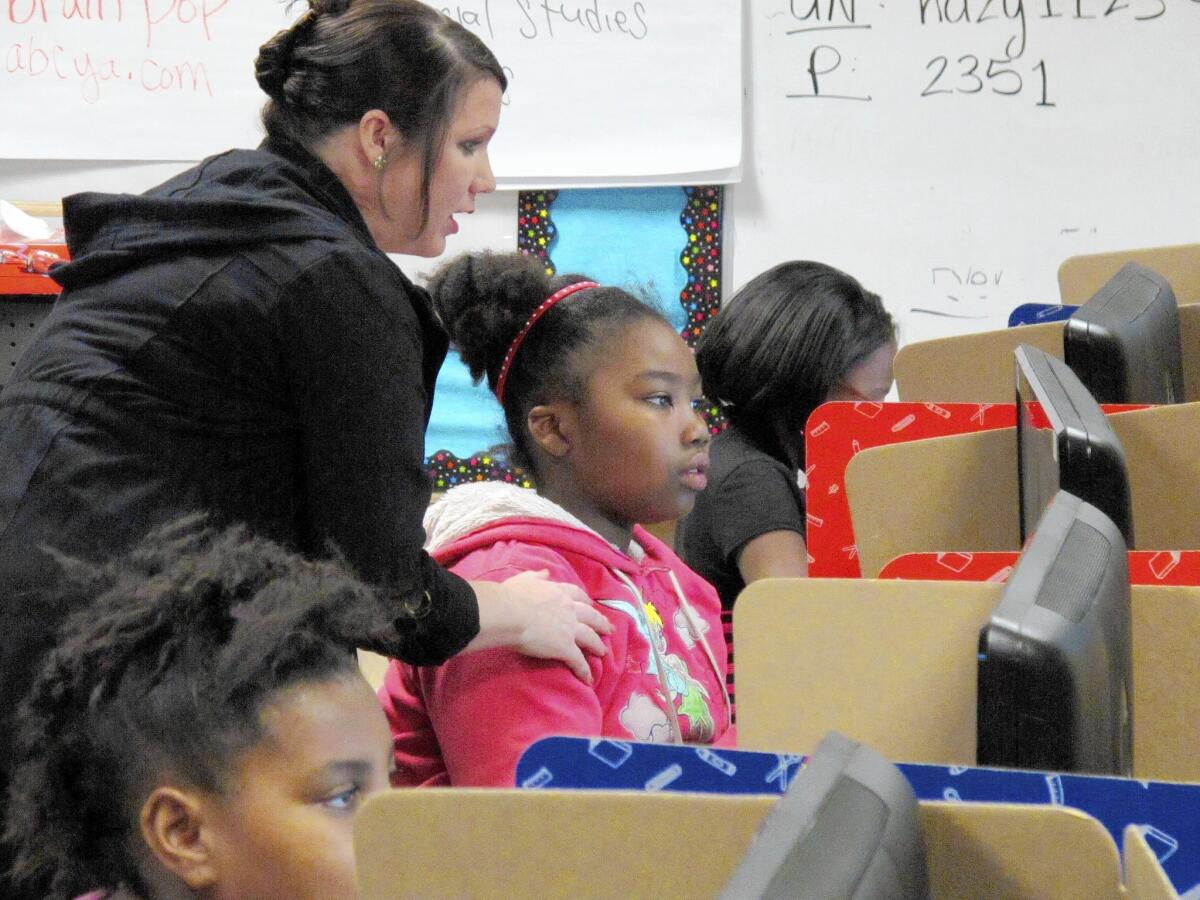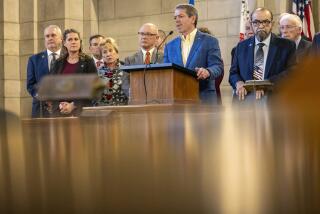Recession’s over: Why aren’t public services coming back?

KANSAS CITY, Kan. — At Noble Prentis Elementary School, a classroom is crammed with 31 students and all their backpacks and books. Last year, the fifth-grade class had just 17 students, but a teaching position was cut when the school ran short of money.
The school nurse, who comes in only twice a week, freezes kitchen sponges to use as ice packs because her budget is too small for her to buy any.
Schools have always had to fight for more funding, but Noble Prentis’ problems were exacerbated during the recession when state budget cuts left schools, like many other public services, foundering. Now, the state’s general fund revenues are up $150 million since 2008, but Kansas officials are in no hurry to restore spending cuts the economic downturn made necessary.
It’s not just Kansas. Conservative legislators committed to the idea that smaller government works best are passing tax cuts that they say help stimulate the economy. They are moving to make recession-era budget cuts permanent.
Even some Democratic governors, stung by the painful cutbacks of the economic downturn, are hoping to rebuild reserves: Gov. Jerry Brown has proposed that California’s surplus go to a rainy day fund, while his fellow Democrats are calling for the state to restore services.
In Ohio, the Legislature eliminated mandatory full-day kindergarten in 2011 and cut state money for local government funds, which help pay for police and fire services, by $1 billion — a decrease of 50%. Wisconsin slashed the amount of money available to local governments. Oklahoma’s governor this year has proposed trimming state agency budgets by 5%, while also suggesting a tax cut.
“Some states are choosing to make reduced services the new normal,” said Michael Leachman, director of state fiscal research at the Center on Budget and Policy Priorities.
Funding per student in Kansas schools is 16.5% lower than it was during the recession, according to Leachman’s organization. State support for libraries, health services and community corrections is also down, all by more than 10%. Kansas state and local governments employ 5,700 fewer people than they did in 2008.
Sara Belfry, a spokeswoman for Kansas Republican Gov. Sam Brownback, said in an e-mail that the governor came into office when the state had $876.05 in the bank and a projected deficit of $500 million. Brownback “made it a priority to streamline and make government more efficient while protecting core services like public safety and education,” she said.
Under Brownback, Kansas has put money back in taxpayers’ pockets. His administration points out that, among other things, the state ranks fourth in the nation in the percentage of its budget committed to education. (Kansas ranked 33rd in the nation in per-student spending in 2012, according to the National Education Assn.).
“A decade of higher taxes, more spending and bigger government failed to deliver prosperity,” Brownback said in his state of the state address this year. But now, he said, “Simply put … the government is back in its proper place — serving the people.”
But smaller state government has failed Kansans in some corners of the state.
Saline County in central Kansas lost more than $1 million in state funding and lacks enough money to maintain the roads, so it closed 20 bridges, forcing residents to drive farther to get to their destinations.
In wealthy Johnson County, the director of the health department says staff cuts mean the department can’t respond as quickly to disease outbreaks.
And in Shawnee County, where the coroner’s budget was cut by more than half in 2011, there is only one forensic pathologist left. If the coroner, Donald Pojman, goes to a meeting or is out sick or on vacation, bodies are held for days before an autopsy can be performed.
“I’m really behind in getting these autopsy reports out in a timely manner — and I used to be very efficient with these,” Pojman said. “But we went from a daytime staff of 15 down to four, and now I have to do the autopsies and the paperwork and coordinate with law enforcement and the courts.”
The governor’s office says that Brownback has streamlined government and encouraged business creation: About 13% more businesses were created in 2013 than in 2011.
Businesses say the tax cuts have helped them thrive, and in a poll sponsored by the state Chamber of Commerce, many small-business owners said they still thought taxes were too high.
“We hear from members that are involved in business expansions who have said without these tax cuts, they wouldn’t have had the money to reinvest and grow,” said Jason Watkins, who is with the Wichita Metro Chamber of Commerce.
But other Kansans are beginning to rebel. Devin Kelly, a parent of a second-grader and a fifth-grader in Johnson County, joined Game On for Kansas Schools, started by parents three years ago.
“A lot of Kansans think, ‘Let it be; don’t make waves,’ and that was me until a year ago,” he said. “Class sizes were the tipping point.”
A coalition of school districts and parents has sued the state, arguing that the funding from the state was not enough to suitably educate children. A three-judge panel agreed, writing that it was “completely illogical” for the state to cut taxes while blaming an economic downturn for spending cuts.
Brownback appealed that decision, and is awaiting a ruling from the state Supreme Court.
Not surprisingly, whether states revert to pre-recession spending levels depends primarily on the party in power. Gordon Lafer, an associate professor at the University of Oregon’s Labor Education and Research Center, points to several states that elected Republican governors in 2010 — Pennsylvania, Ohio, Michigan and Wisconsin — as examples of the philosophy of lower spending.
“For a lot of these actors, the budget cuts and the fiscal crisis is greeted more as an opportunity than a tragedy,” said Lafer, who studied the issue for the left-leaning Economic Policy Institute.
Returning money to taxpayers is also a popular prescription in an election year. Republican governors in Ohio, Wisconsin, Pennsylvania, Michigan and Florida all face potentially tough reelection battles in November, and many are finding tax cuts politically advantageous. Last month, Florida Gov. Rick Scott unveiled what he calls the “It’s Your Money Tax Cut Budget.”
Leachman, of the Center on Budget and Policy Priorities, says that state legislatures are also more polarized than they’ve ever been, making it easier for states to follow one political party’s agenda. In 23 states, Republicans control the governor’s office and both chambers of the legislature; Democrats hold that advantage in 14 states.
“States are more able to pursue a policy prescription that isn’t the result of a compromise between both parties,” he said.
In Ohio, that’s meant less education funding than in 2010 even as income and sales taxes are cut. Schools have eliminated busing, closed early or asked students to pay to participate in extracurricular activities.
Ohio’s Republican Gov. John Kasich “doesn’t need Democratic votes to do anything,” said Dale Butland of Innovation Ohio, a progressive think tank that advocates for state support of services. “Not only have they not replaced the cuts made during the recession, but they have continued to cut taxes in a way that benefits only part of the population.”
In Kansas, the state Supreme Court could overrule decisions by the Legislature on education spending. Schools officials are awaiting that decision, while making do with what they have.
Back at Noble Prentis Elementary in Kansas City, space is so tight that gym class takes place in the cafeteria, which is also used for lunch and music class — sometimes at the same time.
“In this area, there is a day where PE and music overlap. I get an earful from teachers as to the noise,” Principal Jim Poplau said.
The Kansas City school district would love to build a new school, but it isn’t expecting to get any time soon the millions of dollars the state has been collecting.
Poplau says that he’ll continue to operate as he has in the last few years: spending his own money on supplies for needy children, cramming kids into tight classroom spaces — in essence, operating as if a recession is on, even when it’s not.
More to Read
Start your day right
Sign up for Essential California for news, features and recommendations from the L.A. Times and beyond in your inbox six days a week.
You may occasionally receive promotional content from the Los Angeles Times.







